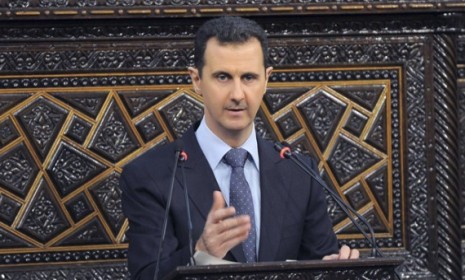Could Syria's WMDs fall into terrorists' hands?
Syria reportedly has one of the world's biggest stockpiles of chemical weapons — and, in the chaos of the country's current mess, extremists may try to grab them

A free daily email with the biggest news stories of the day – and the best features from TheWeek.com
You are now subscribed
Your newsletter sign-up was successful
The relentless violence in Syria has opened the door to an influx of Islamist extremists, stoking fears that al Qaeda affiliates will exploit the chaos to establish a foothold in the country — and tap a network of underground bunkers where the regime of President Bashar al-Assad reportedly stores large stockpiles of chemical and biological weapons. Could jihadists grab Assad's weapons of mass destruction? Here, a brief guide:
What WMD does Syria have?
Syria is one of only seven nations that never signed the 1992 Chemical Weapons Convention, and is widely believed to have one of the largest chemical weapons stockpiles in the world. Possibly as a last-resort defense against a takeover, the Assad regime reportedly has been squirreling away anthrax, mustard gas, sarin, and possibly the VX nerve agent for four decades. "The country is a chemical powder keg ready to explode," according to a recent report by the James Martin Center for Nonproliferation Studies.
The Week
Escape your echo chamber. Get the facts behind the news, plus analysis from multiple perspectives.

Sign up for The Week's Free Newsletters
From our morning news briefing to a weekly Good News Newsletter, get the best of The Week delivered directly to your inbox.
From our morning news briefing to a weekly Good News Newsletter, get the best of The Week delivered directly to your inbox.
Where are these weapons stored?
The Israeli intelligence website Debka File says Assad's chemical and biological weapons are secured in six underground bunkers. But there might be lethal material stored in as many as 50 other sites, according to The Christian Science Monitor, which would significantly complicate the task of ensuring that terrorists don't nab these weapons.
What is the U.S. doing to prevent this?
American intelligence agencies are monitoring sites where Syria is believed to be producing and storing chemical weapons, and, for now, all appear to be firmly in the hands of the regime. A U.S. official told CNN that it would take 75,000 foreign soldiers to swoop in and secure all of Syria's WMD if the Assad regime falls.
A free daily email with the biggest news stories of the day – and the best features from TheWeek.com
Is anything else being done to prevent a disaster?
President Obama is reportedly trying to persuade Russian President Vladimir Putin to get behind a plan to have the United Nations Security Council send in 3,000 to 5,000 armed monitors to guard Syria's WMD. "It's going to take an international effort when Assad falls — and he will fall — in order to secure these weapons," Adm. William McRaven, head of the U.S. Special Operations Command, told a congressional committee this spring.
Sources: Christian Science Monitor, CNN, Debka File, Gulf Today, Heritage Foundation, Wall St. Journal
-
 The environmental cost of GLP-1s
The environmental cost of GLP-1sThe explainer Producing the drugs is a dirty process
-
 Greenland’s capital becomes ground zero for the country’s diplomatic straits
Greenland’s capital becomes ground zero for the country’s diplomatic straitsIN THE SPOTLIGHT A flurry of new consular activity in Nuuk shows how important Greenland has become to Europeans’ anxiety about American imperialism
-
 ‘This is something that happens all too often’
‘This is something that happens all too often’Instant Opinion Opinion, comment and editorials of the day